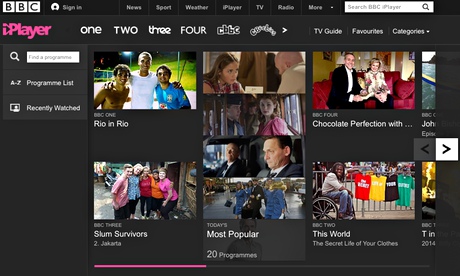
The BBC director general has denied that forcing iPlayer users to have paid the licence fee before using the service would be the first step towards subscriptions.
Tony Hall announced earlier this year that the BBC planned to introduce encryption technology to the iPlayer, so that the estimated 500,000 UK homes where viewers do not have a TV set but watch the corporation’s programmes on-demand would have to start paying the licence fee.
However, on Tuesday Hall told a committee of MPs that this did not mean the first step in moving from the current system of licence fee funding for the BBC to a subscription model.
“The licence fee is a system that isn’t broken,” said Hall. “Be very careful of techno-determinism. If you get away from the licence fee and go down the subscription model ... you will change the nature of what the BBC is about.
“The BBC is about brilliant programmes for everyone. A democratic principle is [that it is] there to get to everyone. As soon as you start building paywalls you begin to diminish that democratic process, the essence of the BBC.”
Hall was responding to the suggestion made by Lord Burns, the Channel 4 chairman, last week that encryption could bethe first step towards a subscription model.
He admitted that the rules regarding the collection of the £145.50 a year licence fee were out of date, leaving a loophole for viewers to use the BBC iPlayer to watch the corporation’s shows without paying.
“Do we think we it needs amendment and modification, yes,” he said, speaking to the Commons culture, media and sport select committee on Tuesday. “To reflect the way people are consuming BBC programmes. We are saying we believe in the licence fee built also saying it needs to change and modernise.”
James Purnell, the BBC’s director of strategy and digital, said it was “odd” that the licence fee rules had not previously been updated to make payment mandatory for those who choose to eschew TV and use catchup TV services.
“It could now be amended to include catch up services as well,” he said. “There is a question of how the licence fee works in practice and the technology around that, that can be solved through parliament.”
Purnell added that the change would “tick the box” and capture the 2% of people who say they never consume traditional TV.
He pointed to a blog post published this week by BBC director of policy James Heath – titled “Why subscription isn’t the best way to fund the BBC” – conveniently timed to support the discussion at the select committee.
Purnell argued against one form of subscription which has been mooted which would see consumers pay for a licence fee covering a core of BBC services, with an option to pay for more deemed non-core as a “top-up”.
“There are two issues that may stop that idea in its tracks,” said Purnell. “How do you decide which services would be in the main licence fee and which would be in the top up. It is likely quite hard to get to agreement about that. Creating the bit for marginal [services] would be very hard. And it might be pretty hard to get money to fund those services.”
He said that even if it was possible to identify non-core “top-up” services, and fund them, the BBC said it did not deliver savings to the public.
“Even if it could be done I’m not sure it would be a terribly good idea in practice,” he said. “We tried to model it - putting BBC3, BBC4, online and iPlayer [in top up] - and it would only save a household £1.40 per month. But if they wanted to pay to get them all back they would pay twice the [monthly] licence fee they are at the moment. Far more people would lose than win, and what they are getting is quite marginal”.
He added: “Why we believe in the licence fee, we believe everyone wins because everyone pays. We believe the licence fee is the right system for the future.”

